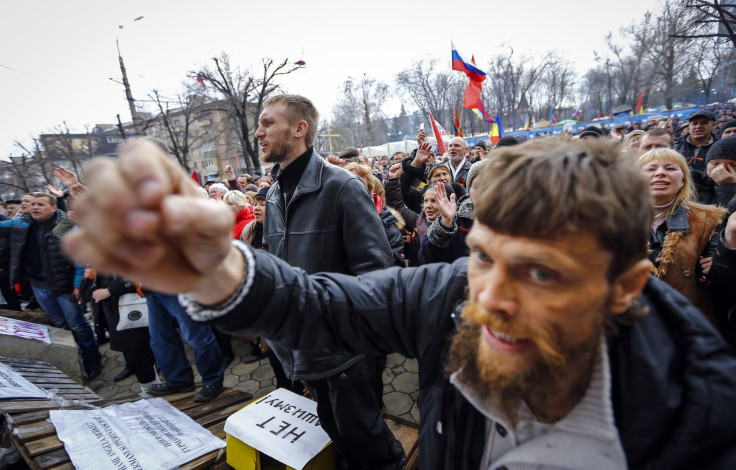US Slams Russia's Claims In A Fact Sheet Stating That The Latter Is Orchestrating Ukraine's Pro-Russian Protests; Refutes Various Claims Made By Russian Government

The U.S. Department of State released a statement Sunday criticizing Russia’s claims of nonintervention in Ukraine, and accused President Vladimir Putin's government of promoting hate and inciting violence in the region.
The statement, called a Fact Sheet by the state department, said that the Ukrainian government has arrested more than a dozen armed Russian intelligence agents in Ukraine and that pro-Russian protesters have been paid to create unrest in the country, even as a report emerged Sunday, which showed that Russia’s military spending in 2013 increased by 4.8 percent to $87.8 billion and that the country spent, for the first time in a decade, a larger share of its Gross Domestic Product, or GDP, on arms than the U.S.
“The Russian propaganda machine continues to promote hate speech and incite violence by creating a false threat in Ukraine that does not exist. We would not be seeing the violence and sad events that we've witnessed this weekend without this relentless stream of disinformation and Russian provocateurs fostering unrest in eastern Ukraine,” the statement said.
Here are the highlights:
1. Russia Claims: Russian agents are not active in Ukraine.
According to the statement, Ukraine’s government has gathered information that Russian GRU (Main Intelligence Directorate) officers had been advising individuals in Kharkiv and Donetsk on how to conduct protests, capture and hold government buildings, seize weapons from government armories, and redeploy for "other violent actions."
2. Russia Claims: Pro-Russia demonstrations are comprised exclusively of Ukrainian citizens acting of their own volition, like the Maidan movement in Kyiv.
“Russian Internet sites openly are recruiting volunteers to travel from Russia to Ukraine and incite violence. There is evidence that many of these so-called “protesters” are paid for their participation in the violence and unrest,” the statement said. “These incidents are not spontaneous events, but rather part of a well-orchestrated Russian campaign of incitement, separatism, and sabotage of the Ukrainian state.”
3. Russia Claims: Separatist leaders in eastern Ukraine enjoy broad popular support.
The statement, citing a poll conducted Donetsk-based Institute of Social Research and Policy Analysis, said that 65.7 percent of Donetsk’s residents want to live in a united Ukraine and do not accept joining Russia.
4. Russia Claims: The situation in eastern Ukraine risks spiraling into civil war.
The statement said that Russian forces placed on the border are to be blamed for the unrest, which has failed to gain public support. “It (the protests) would not be happening if a large Russian military force were not massed on the border, destabilizing the situation through their overtly threatening presence. There simply have not been large-scale protests in the region.”
5. Russia Claims: Ukrainians in Donetsk rejected the illegitimate authorities in Kyiv and established the independent “People’s Republic of Donetsk.”
The statement says that civil society and non-governmental organizations in Donetsk have rejected their support to the faction, and are in turn willing to accept the interim government.
6. Russia Claims: Russia ordered a “partial drawdown” of troops from the Ukrainian border.
According to the U.S., Russian troops continue to be stationed on the Russia-Ukraine border. “No evidence shows significant movement of Russian forces away from the Ukrainian border. One battalion is not enough. An estimated 35,000-40,000 Russian troops remain massed along the border, in addition to approximately 25,000 troops currently in Crimea,” the statement said.
7. Russia Claims: Ethnic Russians in Ukraine are under threat.
The statement, citing a poll on April 5 by International Republican Institute, says that 74 percent of the Russian-speaking population in the eastern and southern regions have stated they “were not under pressure or threat because of their language.”
"Sadly, the ethnic Russians most at risk are those who live in Russia and who oppose the authoritarian Putin regime. These Russians are harassed constantly and face years of imprisonment for speaking out against Putin’s regular abuses of power."
8. Russia Claims: Ukraine’s new government is led by radical nationalists and fascists.
According to the statement, the Ukrainian parliament consists of members from all parties, including the party of ousted former President Viktor Yanukovych. “The new government, approved by an overwhelming majority in the parliament -- including many members of Yanukovych’s former party -- is committed to protecting the rights of all Ukrainians, including those in Crimea,” the statement said.
9. Russia Claims: Ethnic minorities face persecution in Ukraine from the “fascist” government in Kyiv.
“Leaders of Ukraine’s Jewish as well as German, Czech, and Hungarian communities have all publicly expressed their sense of safety under the new authorities in Kyiv. Moreover, many minority groups expressed fear of persecution in Russian-occupied Crimea,” the statement said.
10. Russia Claims: Russia is not using energy and trade as weapons against Ukraine.
The statement said that the Russian government has restricted Ukrainian exports to Russia, which contribute a significant chunk of Ukraine’s export economy, has raised the price of natural gas imported by Ukraine by 80 percent in the last two weeks, and is demanding $11 billion from Ukraine "in back payments following its abrogation of the 2010 Kharkiv accords."
The full text of the Fact Sheet is here.
© Copyright IBTimes 2025. All rights reserved.





















